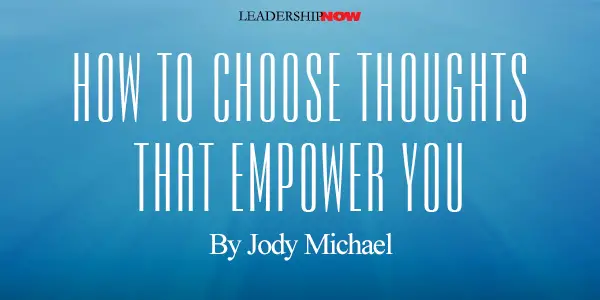 |
 |
07.08.22

How To Choose Thoughts That Empower You
MOST of us think that our beliefs are truth. But beliefs are not facts. Rather, they are a core part of our perceptual lens – the way we view events based on past experiences – and thus very powerful in shaping our everyday experiences. There are all kinds of perceptual lenses, and each of us tends to use and overuse our own few personal favorites. For example, when someone has a competitive lens, they will relate to almost any situation as though it is a competition, whether or not any such competition exists. Someone with a binary lens will relate to most situations as if there is only one right answer, and everything and everyone else is wrong. In my coaching practice, I ask every client to talk about the most important beliefs they hold about themselves, their family, work, money, and more. It’s a way into understanding their perceptual lens. Often, this is the first time they’ve ever given this topic any thought, and many get stuck. It’s not that they have no beliefs; they just can’t “see” them. We work together to tease out these lenses. Some of the more common ones are listed here. Do any resonate with you? Impeding Lens: “I’m not as competent as people think; I’m a fraud.” Usually, this belief is not accurate. You hold it because you’re highly critical of yourself. Deep down, you simply think you are not good enough. A better choice: “I can build confidence.” Instead of discounting your entire self as incompetent and fraudulent, turn it around and get more detailed and granular. Ask yourself, “Where, specifically, do I need to improve? Where do I need to shore up my knowledge or experience so I can be confident in my abilities?” That’s a more helpful lens than walking around with an excuse for feeling like you’re not good enough. In other words, we say, “You don’t think you’re confident. Okay, let’s identify where—and then let’s fix that.” Impeding Lens: “I am successful because I work harder and longer than anyone else.” This approach is not helpful for a couple of reasons. First, you are on the road to burnout, and while you are burning out, you are going to miss out on your family, playtime, rest, and life in general. Second, it could be a sign that you don’t have the right aptitude for your job. Let’s take a simplistic example to make the point. If somebody is an accountant and they don’t have the aptitude, it’s very hard for them to do the same amount of work as the guy in the office next door who loves the work and finds it comes easily to him. A better choice: “How do I achieve balance?” Instead of insisting that you work harder and longer than everyone else, switch your focus. Ask yourself: “How can I achieve similar results and also feel more in balance?” This will lead you to place more emphasis (thoughts, moods, and actions) on prioritizing, delegating more effectively, and leveraging the 80/20 rule, where 80 percent of your success stems from 20 percent of your efforts. That means you need to select lenses that allow that to happen. So often, we have a habit of overworking, or being a perfectionist or spending much longer than needed without a measurably better result. Adding “balance” into your lens of productivity will lead you to a way of working that ultimately gets more done, more effectively, and sustains your well-being over the long haul. (Potentially) Impeding Lens: “If I want it done right, I have to do it myself.” This lens is fine if you want to be an individual producer. Stay with it, and you will be amazing. However, you will never leverage yourself and your skills to be able to develop people or have two thousand people under you, because you won’t be able to delegate. If you want to be a senior leader, this lens won’t work. That said, not everyone wants to be a senior leader, and that’s okay. A better choice: Create a safe, secure, supported team. If you do want to be a leader, you need to truly understand that you can’t do it all by yourself. You need to accomplish your goals through others, and that means you need to create followership, and people won’t follow you unless you make them feel safe, secure, and supported as you lay out the clear objectives you want them to accomplish. Whatever your beliefs, the majority were indoctrinated in you throughout your formative years. You learned and absorbed them from your parents, teachers, friends, and even the media—TV, movies, radio, newspapers—you consumed. Now, with adult eyes, you can reconsider and ask yourself: How are those beliefs serving you? What outcomes do they create? Do they consistently help you experience a better life for yourself and those around you? Do they build you up, and build others up, creating optimism, possibility, and a sense of opportunity? You can’t be human and be without any lenses, but you can be aware of your lens, as well as be intentional about choosing an appropriate lens for any given situation.  
Posted by Michael McKinney at 07:30 AM
|
BUILD YOUR KNOWLEDGE
 

How to Do Your Start-Up Right STRAIGHT TALK FOR START-UPS 
Grow Your Leadership Skills NEW AND UPCOMING LEADERSHIP BOOKS 
Leadership Minute BITE-SIZE CONCEPTS YOU CAN CHEW ON 
Classic Leadership Books BOOKS TO READ BEFORE YOU LEAD |